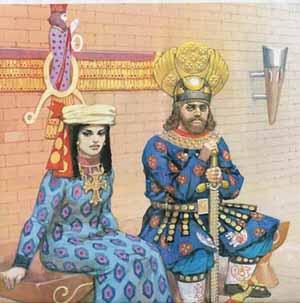
King Khosrow II. and his Christian wife Shirin (their love immortalized in poems and songs).

Posted on 05/18/2008 10:52:41 PM PDT by BlackVeil
Zoroastrian texts such as the Avesta clearly define the status of Persian women and reveal that at a time when many women in the world were deprived of their basic rights, Persian women enjoyed social and legal freedom and were treated with great respect.
Avestan texts mention both genders asking them to share responsibility and make decisions together. They are equally praised for their good deeds rather than their gender, wealth or power.
“Whoever, man or woman, does what Thou, O Ahura Mazda, knowest to be the best in Life. Whoever does right for the sake of Right; Whoever in authority governs with the aid of the Good Mind, I shall bring all these to join in songs of Thy Praise, Forth, shall I with them cross the Bridge of Judgment.”
In ancient Persia, women could take the throne in case the king passed away and the crown prince was still a minor. One such woman was Pourandokt, the first Persian queen regnant in Ctesiphon. Ancient scriptures describe her as a wise, just and good-natured woman who did her best to revive the Sassanid sovereignty.
Avestan texts address the issue of leadership and tell us that a ruler may be a woman as well as a man.
"May a good ruler, man or woman, reign in both the material and spiritual existences." (Yasna 41/2)
Zoroastrian texts advise parents to encourage their offspring to tread the path of knowledge and explain that women have an equal responsibility in the dissemination of knowledge and science.
"Whatever a man or a woman knows that is good and right, not only should they practice, but inform others to perform accordingly". (Yasna 41/2)
According to zoroastrian texts, female members of the Persian society were allowed to participate in religious ceremonies and sometimes even head the event as the priest.
Persian women were free to choose their spouse and Zoroaster urged them to make their decision based on wisdom.
"May God grant you him who is steadfast in good mind and united with righteousness and with the Wise One. Therefore consult with your wisdom and decide in full tranquility." (Yasna 53/3)
Regarding young couples, Zarathustra advises them to remain faithful, share their joy and sorrow, to adhere to the principles of good mind and love, and to try to surpass one another in truth and righteousness.
Reference has been made to the role of Persian women in society. According to Greek historian and biographer Plutarch, Persian women were active members of their society and good fighters.
There were numerous female fighters among the ranks of the Sassanid army. They have been described as excellent and competent soldiers.
According to Pahlavi texts such as the Din-Kard, women could manage their property, represent their husbands at court, chair courtrooms and perform religious ceremonies.
Ancient documents found at Persepolis, Susa and other Mesopotamian cities show that both noble and common women enjoyed economic independence in Persia.
They owned property, were involved in managing their assets, had employment opportunities and earned wages.
Although noble Persian women had to act within a defined framework set by the king, they also enjoyed economic independence and had control over their wealth.
Women were allowed to visit their estates and administer their assets individually or with the help of their husbands.
Ancient documents mention common women by the title bestowed upon them due to the nature of their work; the level of skill determined a female manager's title.
The highest-ranking female workers were known as arashshara (great chief). They managed female and male workers and received the highest salary among their peers.
Historical documents show that male and female workers received equal pay and that there were an equal number of workers from both genders.
The late Persian Empire should serve Westerners as a prime example how a highly advanced civilization, thought to be lasting, can be destroyed and subverted by Islam.
Iran ping

King Khosrow II. and his Christian wife Shirin (their love immortalized in poems and songs).

Don’t get Zoroastrian confused with modern Iran. The Zoroastrians fled Persia due to persecution of Islam and moved to other areas, mostly British owned areas. Hence Freddie Mercury and his Zoroastrian family and his British education. His father was a British civil servant in Zanzibar even.
These people were far more advanced than many in that region and were smart enough to get the hell out when the corrupt Islam came along.
I think the majority of Iran is still pro western. During the 60’s, 70’s, and 80’s, American colleges were chuck full of Iranians who were truly interested in Western ideas and science and culture.
We saw the same crap happen in Lebanon. Poverty and being uneducated has led to the fundamentalist takeover.
“The Zoroastrians fled Persia due to persecution of Islam and moved to other areas, mostly British owned areas.”
They moved into India (mostly) given India’s rich traditions of welcoming foreigners. The story of the Parsees who located wholescale into India following the muslim invasion is a moving one and I’ve visited the spot where the Parsees landed on Indian soil. Today, the Parsees (Zoroastrians) are located in their largest numbers in India (and that includes Fredie Mercury’s sister who still lives in Mumbai).
The British had nothing to do with the large scale Parsee migration after the destruction of the Persian civilization by the animal muslims.
Bookmark
The Zoroastrians were a great advanced civilized people that achieved many things. Wish they hadn’t gotten wiped out by the winds of history, Persia and the world would have been a much better place.
Then the deranged followers of Mad Mo took over ...
 ... knowest to be the best in Life.
... knowest to be the best in Life.
It means that it survived Ahmadinejad (2005-2013) but was removed during Rouhani.
Today there are protests in Iran on Wednesdays against the compulsory Hijab.
https://www.mystealthyfreedom.org/topics/news/white-wednesdays/
There still are 25,000 in Iran.
Protests haven’t stopped in Iran. They just don’t make the news
In other news...
Disclaimer: Opinions posted on Free Republic are those of the individual posters and do not necessarily represent the opinion of Free Republic or its management. All materials posted herein are protected by copyright law and the exemption for fair use of copyrighted works.